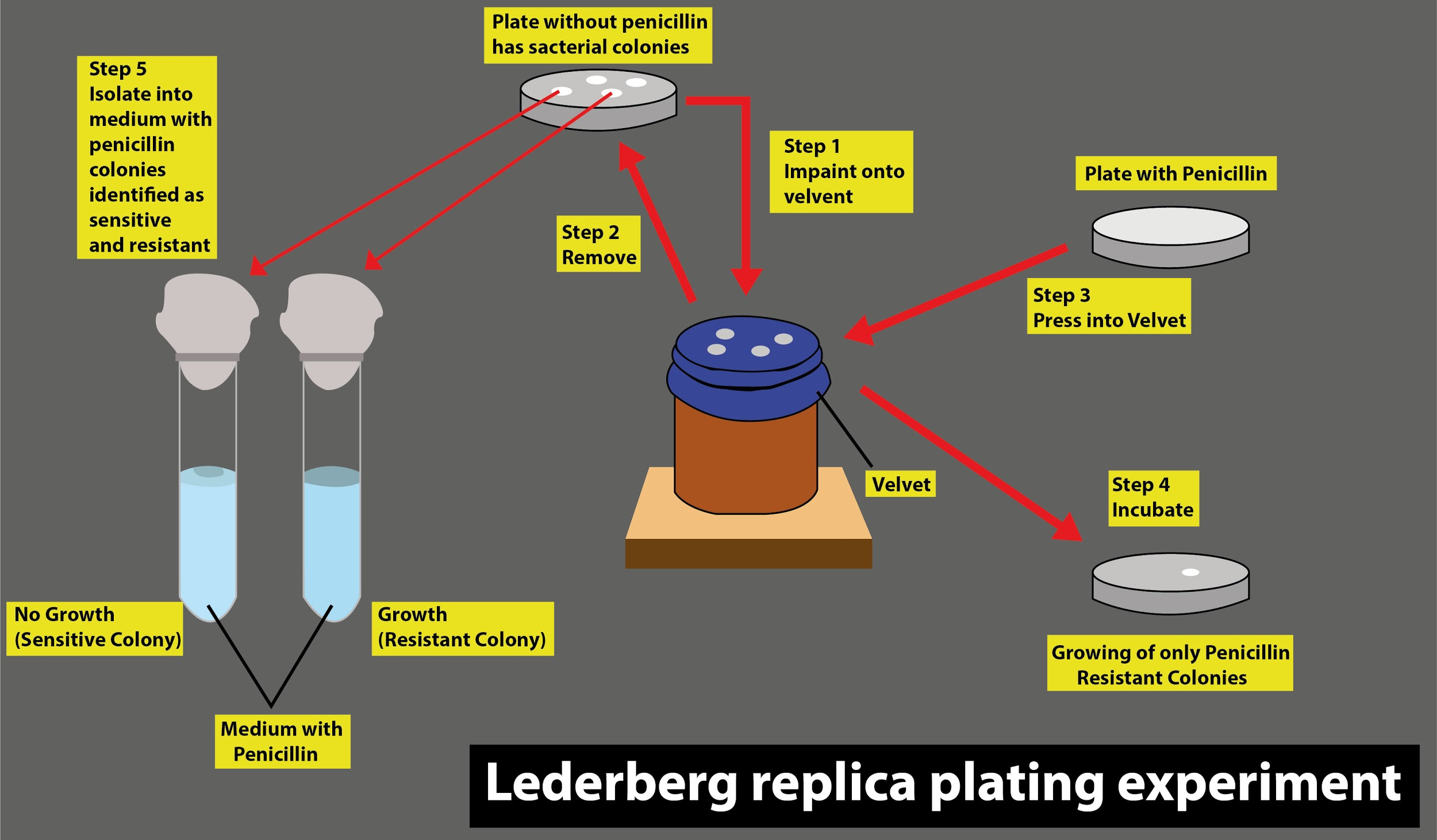
give an account of Lederberg’s replica plating experiment to show the genetic basis of evolution
Answer
576k+ views
Hint: It is a method that aid a colony or number of clones is inoculated on a different plate according to the numbered scheme. In this, each colony is tested by different types of methods, while maintaining the master plate from which the clones have been picked.
Complete answer:
-The experimental explanation of the genetic basis of adaptation is given by Joshua Lederberg and Esther Lederberg.
-They both have done an experiment on bacteria to explain the genetic basis of evolution. They inoculated a dilute suspension of bacteria on an agar plate and obtained a master plate
-They saw that after some time, the master plate contains many different bacterial colonies.
-Each colony which is produced by a repeated division from a single bacteria represents a clone. Hence, they prepared many same types of master plates on a new agar plate.
-Now, they tried to produce bacteria on the replica plate in presence of antibiotics i.e penicillin. They saw that many colonies of bacteria failed to grow on replica plates in the presence of antibiotics.
-Only some of the colonies seem to grow in the presence of Penicillin and found resistance and concluded that some bacteria have the ability to survive in a new environment.
-Survived colonies of bacteria show the genetic basis of evolution.
Lederberg’s replica plating experiment gave two explanations-
1)Lamarck’s view- when penicillin is given it induces changes in bacteria and enables the Bacteria to grow in a new environment.
2)Darwin's view- shows the selected view of survival as the original culture already has this variety and it's favored the new environment.

Note: -So, Lederberg’s replica plating experiment to show the genetic basis of evolution because many colonies in the presence of antibiotics were able to survive and found resistance to penicillin.
-penicillin-induced changes in bacteria and enable the bacteria to grow in a new environment.
-They also concluded that many mutations are random, not directed.
Complete answer:
-The experimental explanation of the genetic basis of adaptation is given by Joshua Lederberg and Esther Lederberg.
-They both have done an experiment on bacteria to explain the genetic basis of evolution. They inoculated a dilute suspension of bacteria on an agar plate and obtained a master plate
-They saw that after some time, the master plate contains many different bacterial colonies.
-Each colony which is produced by a repeated division from a single bacteria represents a clone. Hence, they prepared many same types of master plates on a new agar plate.
-Now, they tried to produce bacteria on the replica plate in presence of antibiotics i.e penicillin. They saw that many colonies of bacteria failed to grow on replica plates in the presence of antibiotics.
-Only some of the colonies seem to grow in the presence of Penicillin and found resistance and concluded that some bacteria have the ability to survive in a new environment.
-Survived colonies of bacteria show the genetic basis of evolution.
Lederberg’s replica plating experiment gave two explanations-
1)Lamarck’s view- when penicillin is given it induces changes in bacteria and enables the Bacteria to grow in a new environment.
2)Darwin's view- shows the selected view of survival as the original culture already has this variety and it's favored the new environment.

Note: -So, Lederberg’s replica plating experiment to show the genetic basis of evolution because many colonies in the presence of antibiotics were able to survive and found resistance to penicillin.
-penicillin-induced changes in bacteria and enable the bacteria to grow in a new environment.
-They also concluded that many mutations are random, not directed.
Recently Updated Pages
Master Class 12 Economics: Engaging Questions & Answers for Success

Master Class 12 Physics: Engaging Questions & Answers for Success

Master Class 12 English: Engaging Questions & Answers for Success

Master Class 12 Social Science: Engaging Questions & Answers for Success

Master Class 12 Maths: Engaging Questions & Answers for Success

Master Class 12 Business Studies: Engaging Questions & Answers for Success

Trending doubts
Which are the Top 10 Largest Countries of the World?

What are the major means of transport Explain each class 12 social science CBSE

Draw a labelled sketch of the human eye class 12 physics CBSE

Why cannot DNA pass through cell membranes class 12 biology CBSE

Differentiate between insitu conservation and exsitu class 12 biology CBSE

Draw a neat and well labeled diagram of TS of ovary class 12 biology CBSE




